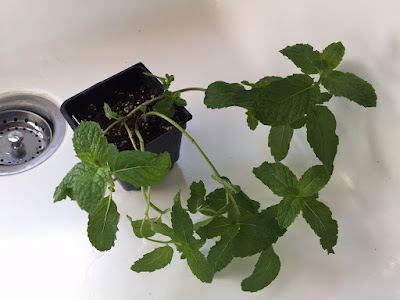Spouse and I have been talking lately about all the stuff I've been sorting through in our basement. This is a frequent topic of conversation, since it occupies many of my waking hours and nearly all of my thoughts these days. A couple of days ago, the subject of collections came up, prompted by the boxes of stamps that littered our kitchen table.
Before the estate sale, I brought home my stamp collection book plus all of the loose stamps and other paraphernalia I had amassed as a child. Truthfully, I really should have brought it all to our house many years ago, but it took up quite a bit of space so I just left it in my parents' basement.
As part of my mission to get rid of stuff, I set about finding a new home for my stamp collection. I did a bit of online research to see if stamp collections have any value.
They don't.
Unless you've got a rare stamp with documentation, stamps have plummeted in value. Not very many people collect stamps these days and because there is little interest, stamp collections can be hard to sell. It certainly would not be worth putting it on eBay, so I took the collection to a local dealer to see what he would offer.
He gave me $20 and a bag of broccoli from his garden. Seriously.
As you can see in this sideways photo (sorry about that!), I had filled a few pages of my album with stamps. I always thought some of these old stamps had value. Maybe they did at one point, but not today.
Most pages looked like this, more sparsely filled. Still, I hoped that the stamps from foreign countries might hold some value. Nope.
I also took in several batches of loose stamps, including many uncancelled foreign stamps in glassine envelopes which I hoped would be worth something. Nope. Even my plate block sheets of vintage stamps are apparently better used as postage. Loose stamps like the ones in the box are now sold BY THE POUND, which tells you how little they are worth.
I'll admit it: Hearing that my collection had little value was a bit hard to swallow. But I knew from my online research that it was true. The dealer's offer was fair -- and probably generous.
So back to the subject of collections. As a child, I started very few collections on my own out of interest in a particular topic. Instead, my family decided that I should collect ITEM X and started the collection for me. This always put me in a difficult spot as I wanted to be gracious to my family, but it's hard to keep up with a collection if it's not really something that intrigues you. Over time, I did develop an interest in stamp collecting but not enough to sustain it long-term.
Once people learned I had a stamp collection, everyone started saving stamps for me. In going through my collection, I found BOXES and BOXES of cancelled stamps from people in our town. The same thing happened to me when I decided to collect paper napkins (don't ask...) back in junior high. EVERYONE GAVE ME THEIR NAPKINS. I really didn't want napkins from events I hadn't attended but I didn't want to offend anyone, so I accepted the boxes of napkins graciously.
Guess what I'm sorting through now.
Spouse thinks no one should collect anything...ever. Although I think that's a bit harsh, I'm inclined to agree. Collections found in estate situations are hard to handle, simply because you have SO MANY of one type of item. My mom collected several types of figurines, and none of them were worth anything at our sale.
Remember Beanie Babies? They were worth a lot of money for a few years, but the bottom fell out of the market and now (with a few exceptions), you almost have to pay people to buy them. It seems that only a few types of collectibles increase in value over the years. As an example, my dad collected toy John Deere tractors which HAVE held their value and sold well at the auction.
So I have mixed emotions about collections. I certainly
enjoyed some of my collections over the years, but I know from experience that
they can be troublesome in the end. Having dealt with several types of collections now, I guess my advice is this: Don't start a collection. If there's something you like or enjoy, limit yourself to one or two of that item. You'll enjoy a single Delft plate more than 200 pieces which are hard to store and difficult to display.
If you have already have a collection, be aware of the current value and pare it down while there is still a market for it. If there is no monetary value, consider giving special pieces to family members who share an interest. Do your best not to leave 300 porcelain bears (or 50 ceramic angels, or...) for someone to handle after you're gone.
jp



















































